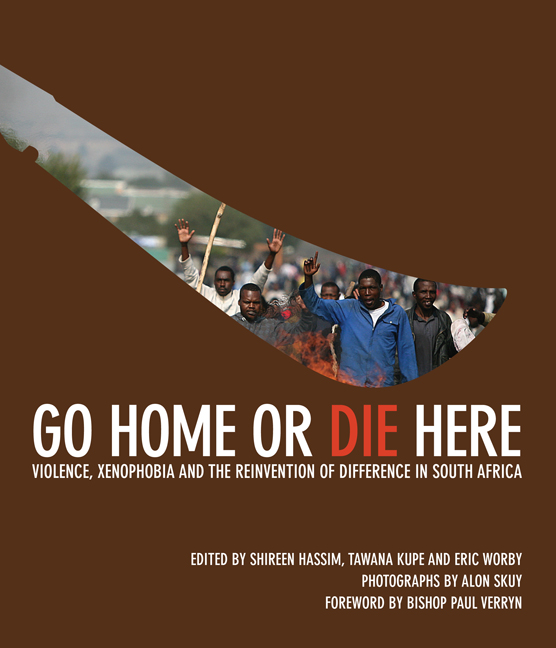Book contents
- Frontmatter
- Table of Contents
- Foreword
- Introduction
- A Torn Narrative of Violence
- I Did Not Expect Such a Thing to Happen
- (Dis)connections: Elite and Popular ‘Common Sense’ on the Matter of ‘Foreigners’
- Xenophobia in Alexandra
- Behind Xenophobia in South Africa – Poverty or Inequality?
- Relative Deprivation, Social Instability and Cultures of Entitlement
- Violence, Condemnation, and the Meaning of Living in South Africa
- Crossing Borders
- Policing Xenophobia – Xenophobic Policing: A Clash of Legitimacy
- Housing Delivery, the Urban Crisis and Xenophobia
- Two Newspapers, Two Nations? The Media and the Xenophobic Violence
- Beyond Citizenship: Human Rights and Democracy
- We Are Not All Like That: Race, Class and Nation after Apartheid
- Brutal Inheritances: Echoes, Negrophobia and Masculinist Violence
- Constructing the ‘Other’: Learning from the Ivorian Example
- End Notes
- Author Biographies
Violence, Condemnation, and the Meaning of Living in South Africa
Published online by Cambridge University Press: 04 June 2019
- Frontmatter
- Table of Contents
- Foreword
- Introduction
- A Torn Narrative of Violence
- I Did Not Expect Such a Thing to Happen
- (Dis)connections: Elite and Popular ‘Common Sense’ on the Matter of ‘Foreigners’
- Xenophobia in Alexandra
- Behind Xenophobia in South Africa – Poverty or Inequality?
- Relative Deprivation, Social Instability and Cultures of Entitlement
- Violence, Condemnation, and the Meaning of Living in South Africa
- Crossing Borders
- Policing Xenophobia – Xenophobic Policing: A Clash of Legitimacy
- Housing Delivery, the Urban Crisis and Xenophobia
- Two Newspapers, Two Nations? The Media and the Xenophobic Violence
- Beyond Citizenship: Human Rights and Democracy
- We Are Not All Like That: Race, Class and Nation after Apartheid
- Brutal Inheritances: Echoes, Negrophobia and Masculinist Violence
- Constructing the ‘Other’: Learning from the Ivorian Example
- End Notes
- Author Biographies
Summary
Refugees, asylum seekers, immigrants, illegals, border jumpers, displacees, Nigerians, aliens, amakwerekwere have long been on South Africans’ minds. For many they are primarily groups to be feared, disdained, occasionally pitied, often exploited and seen as a threat to the country's wealth and health. The country's government and much of its civil society has long turned a blind eye to foreigners’ systematic marginalisation, mass deportation (close to 300 000 people in 2007) and the ever more rapid and rabid murders at the hands of the country's citizenry.
When the government did react to violence against foreigners, its responses were two-faced: chastising communities for their intolerance while accelerating arrests and removals. In a nationally broadcast speech on 25 May, President Thabo Mbeki encouraged South Africans to ‘… build on the tradition of many decades of integrating our foreign guests within our communities’. Given the history of exploitation, alienation and expulsion, it is hard to imagine where he (or anyone else) got the idea that government or citizens have ever promoted the peaceful integration of migrants into South African society.
But my concern here is not with the long-term disregard for migrants’ rights and welfare. Nor is it to condemn the initial denialism of crisis or the tardy and ineffective efforts to help those who were violently displaced. Rather, this piece considers what the responses by South African citizens and institutions reveal about being from and living in South Africa.
In particular, I am interested in two puzzling reactions to the violence. The first is the uncharacteristically startling reaction from civil society – particularly middle class South African society – and the normative content of that reaction. The second is the strange dichotomy officials made between xenophobic and criminal motivations and their insistence that what took place was criminal.
As a moment of crisis when the security of residents’ bodies, possessions and values came under question, the violence serves both to destroy and create. Speaking in the most general and aggregated terms, the attacks have helped generate three incompatible views of life in South Africa. The first is a renewed (if circumscribed) commitment to cosmopolitan nationalism by elements of South Africa's middle class and government elite: to respect the rights of all living in the country.
- Type
- Chapter
- Information
- Go Home or Die HereViolence, Xenophobia and the Reinvention of Difference in South Africa, pp. 105 - 118Publisher: Wits University PressPrint publication year: 2008



